German postcard in the Film Sterne series by Rotophot, no. 90/5. Photo: Karl Schenker.
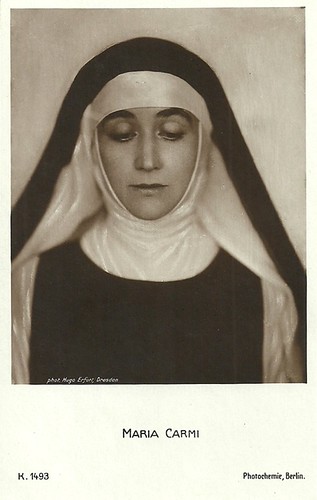
German postcard by Photochemie, Berlin, no. K. 1493. Photo: Hugo Erfurt, Dresden. This card may refer to the film Das Wunder der Madonna (Walter Schmidthässler, Robert Reinert, 1915-1916), but it could also refer to Carmi's popular stage play 'Das Mirakel' (The Miracle) by Max Reinhardt, staged first in 1911 (after which many reprisals followed), and filmed twice in 1912.

German postcard by Photochemie, Berlin, no. K. 1497. Photo: Hugo Erfurt, Dresden.
German postcard by Photochemie, Berlin, no. K. 1498. Photo: Hugo Erfurt, Dresden.
German postcard by Photochemie, Berlin, no. K. 1499. Photo: Hugo Erfurt, Dresden.
The Miracle
Maria Carmi was born Norina Gilli in Firenze (Florence), Italy, in 1880.
When she married German comedy writer Karl Volmöller she moved to Berlin, where she attended Max Reinhardt's acting school at the Deutsches Theater. She belonged to his company from 1907 to 1909 and used the stage name Maria Carmi.
In 1911, Reinhardt asked her for the pantomime play Das Mirakel/The Miracle written by her husband, Karl Vollmöller. The religious pantomime was originally produced in Germany in 1911 and opened in London on 23 December 1911. Over the years she would give over 1,000 performances of the play.
The next year it was turned into a film, Das Mirakel/The Miracle (Cherry Kearton, Max Reinhardt, 1912). She also appeared in Reinhardt's film Eine Venezianische Nacht/A Venetian Night (Max Reinhardt, 1914) with Alfred Abel.
When she returned to Italy, the Cines company asked her for the psychodrama Retaggio d'odio/A Legacy of Hate (Nino Oxilia, 1914) with Bruto Castellani, followed by La mia vita per la tua/My Life for Yours (Emilio Ghione, 1914), after a story by Matilde Serao.
She also appeared in two mythical precursors of neorealism: Sperduti nel buio/Lost in Darkness (Nino Martoglio, 1914) and Teresa Raquin/There Raquin (Nino Martoglio, 1915). Both films are (partially) lost.
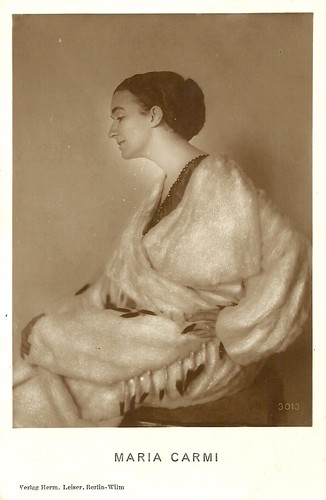
German postcard by Verlag Hermann Leiser, Berlin-Wilm., no. 3013. As Maria Carmi wears an ermine cloak, this may refer to Carmi's film Der Hermelinmantel (Walter Schmidthässler, Deutsche Bioscop 1915), scripted by Karl Volmoeller.
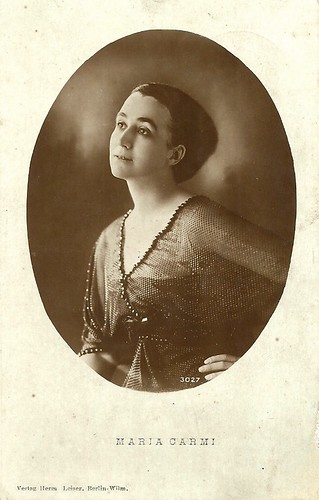
German postcard by Verlag Hermann Leiser, Berlin-Wilm., no. 3027.
German postcard by Verlag Hermann Leiser, Berlin-Wilm., no. 3054.
German postcard by Verlag Hermann Leiser, Berlin-Wilm, no. 5198. Photo: Becker & Maass.
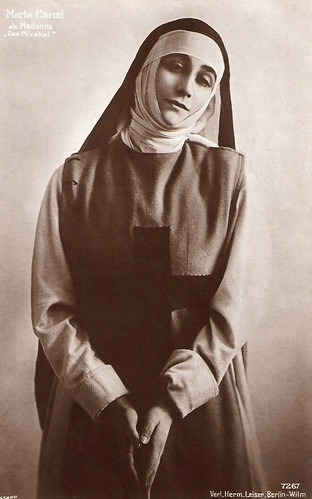
German postcard by Verlag Hermann Leiser, Berlin-Wilm., no. 7267. Photo: publicity still for Das Mirakel/The Miracle (1912), in which Carmi played the Madonna.
Expressively Waving Hands
When Italy joined the Allied forces in the First World War, Maria Carmi followed her husband to Germany. Till the end of the war, she made some 20 films there, often directed by Robert Reinert.
Almost all her German films are lost, including a memorable adaptation of Hedda Gabler (1915) and two parts of the popular horror serial Homunculus (Otto Rippert, 1916) featuring Olaf Fönss.
The German public went mad for Carmi's amorous beauty and charm, and for her long, always expressively waving hands. Carmi divorced Karl Vollmöller due to his affair with the actress Lena Amsel.
Maria returned to Italy, where her by now older German films were re-released in Italianized versions in order to bypass the boycott of German products and fared pretty well.
Carmi, however, encountered ferocious opposition towards her film Forse che sí, forse che no/Maybe Yes, Maybe No (Gaston Ravel, 1922) based on a novel by Gabriele D'Annunzio. According to film historian Vittorio Martinelli, Carmi was so disappointed and bitter about this that she withdrew from the cinema and returned to the stage, interpreting Luigi Pirandello, Marinetti, and other playwrights for Bragaglia's Teatro degli Independenti.
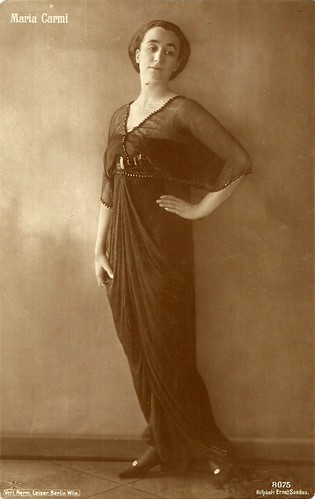
German postcard by Verlag Hermann Leiser, Berlin-Wilm., no. 8075. Photo: 'Hofphotograph' [court photographer] Ernst Sandau.
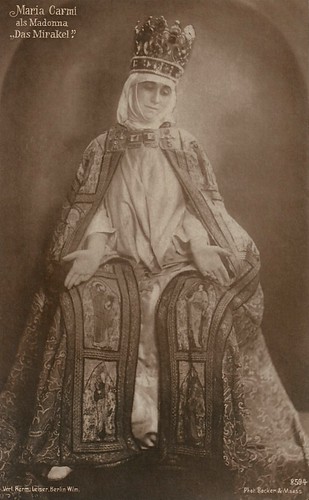
German postcard by Verlag Hermann Leiser, Berlin-Wilmersdorf, no. 8594. Photo: Becker & Maass.
German postcard by Meisenbach Riffarth & Co, Berlin-Schöneberg. Photo: Schenker / Deutsche Bioscop.
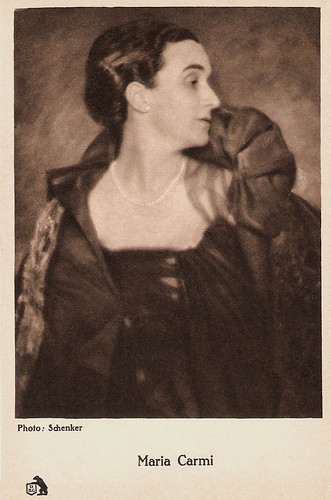
German postcard by Meisenbach Riffarth & Co, Berlin-Schöneberg. Photo: Schenker / Deutsche Bioscop.
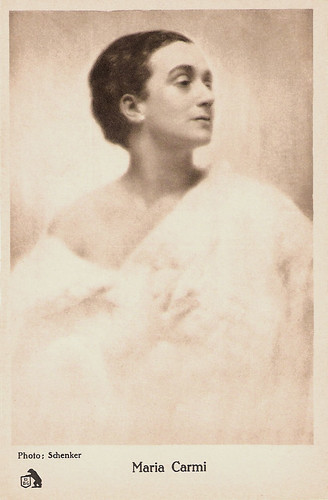
German postcard by Meisenbach Riffarth & Co, Berlin-Schöneberg. Photo: Schenker / Deutsche Bioscop.
Princess Norina
In the spring of 1917, Maria Carmi had married Prince Georges V. Matchabelli in Stockholm, Sweden. The Georgian prince and diplomat had been the ambassador to Italy.
After the Bolshevik takeover of Georgia, he and his wife immigrated to the United States. Maria became known as Princess Norina Matchabelli.
In 1924, she and her husband, who was also an amateur chemist, co-founded the now-famous perfume company Prince Matchabelli. Norina designed the perfume bottle after the family crown that became the brand's trademark. In 1933 they divorced.
Georges died in 1935 and a year later Norina sold the company to Saul Ganz for $250,000. Norina settled in New York, where she opened with well-known set designer Frederic Kiesler an acting school, American Laboratory Theatre, concentrating on mime.
In 1931 she dedicated herself to esotericism and found spiritual guidance from the Indian guru Meher Baba. She also founded the periodical Meher Baba Journal in 1938.
Norina Matchabelli died in Myrtle Beach, South Carolina, in 1957, at the age of 77.

British postcard by Rotary Photo, no. 7701 C. Photo: Hoppe, London. Publicity still of the London stage production of Das Mirakel/The Miracle (Max Reinhardt, 1912) with Maria Carmi as the Madonna. Here she has just cured the lame.

Spanish postcard by Edis. y Publics. de Arte Planas, Barcelona, Card 4 Photo: Obsequio Palace (Morgana Film). Maria Carmi and Dillo Lombardi in Sperduti nel buio/Lost in the Dark (Nino Martoglio, 1914). According to some, Roberto Danesi was the co-director. The film was based on a homonymous play (1901) by Roberto Bracco. The film was produced by the Roman company Morgana Film, which had as its goal to adapt naturalist plays for the cinema. Sperduti nel buio is the No. 1 lost film of Italian film history.

German postcard by Verleih Hermann Leiser, Berlin-Wilm., no. 9921. Photo: Deutsche Bioscop. Maria Carmi and Einar Brun in the German silent film Die Richterin von Solvingsholm (Emil Justitz or Robert Reinert, 1916).

German collectors card by Ross Verlag in the series Vom Werden Deutscher Filmkunst - Der Stumme Film, picture no. 23, Group 43. Photo: Ufa. Maria Carmi and Carl de Vogt in Der Weg des Todes/The Road of Death (Robert Reinert, 1916).

Italian postcard by G.B. Falci, Milano, unnumbered. Photo: Unione Cinematografica Italiana. Maria Carmi as Isabella Inghirami in the Italian silent film Forse che sí, forse che no (Gaston Ravel, 1920), based on Gabriele d'Annunzio's eponymous novel (1910). The maddened Isabella does not understand Paolo's pleas anymore.
Sources: Vittorio Martinelli (Le dive del silenzio - Italian), Wikipedia and IMDb.
This post was last updated in 11 June 2021.
Jai Baba!!!
ReplyDeleteJai Baba!!!
ReplyDeleteWonderful! Nice to have information about Maria Carmi's early career. Thank you for your good research.
ReplyDeleteFYI: One little correction. According to the biography by Frederik Tunnat, "Karl Vollmoeller", Norina Vollmoeller divorced Karl due to his affair with the actress Lena Amsel. According to her marriage certificate from Stockholm, Sweden, she married Prince Georges Matchabelli in the spring of 1917.
ReplyDeleteThanks for your correction. We've updated the post.
ReplyDelete